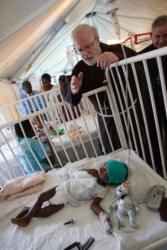Cardinal tours Haitian earthquake damage
PORT-AU-PRINCE, Haiti (CNS) -- Cardinal Seán P. O’Malley, who traveled to Haiti as part of a March 1-3 tour of the earthquake-damaged Haitian capital as part of an advisory group from the U.S. Conference of Catholic Bishops, called the trip “a very moving experience” and praised the efforts that Catholic organizations are playing in the aftermath of the Jan. 12 earthquake.
In a March 3 telephone interview with The Pilot from Port au Prince, the cardinal praised the resilience of the Haitian people when confronted with natural disasters.
“(They) have suffered a lot and yet they maintain a great spirit, and a dignity, and a desire to move ahead,” he said.
The cardinal explained that the Catholic Church in Haiti is the largest institution providing education, medical care, and social services and that many of their facilities have been destroyed and will have to be rebuilt.
“The Haitian Church is going to need a lot of help going forward to rebuild its communities so they can serve the people.”
The Bishops Conference delegation included Archbishop Jose H. Gomez of San Antonio, Auxiliary Bishop Guy Sansaricq of Brooklyn, N.Y., and Oblate Father Andrew Small, director of the bishops’ Church in Latin America office.
Walking around the massive tent city at the Petionville Club March 2, Archbishop Gomez, chairman of the U.S. bishops’ Subcommittee on the Church in Latin America, wondered what will become of the thousands of Haitians left homeless by the earthquake.
The delegation met with Haitian bishops and had a private dinner meeting with Haitian President Rene Preval at the residence of Archbishop Bernardito Auza, papal nuncio to Haiti.
In the meeting with Haitian bishops, the delegation discussed the importance of strengthening existing Church institutions and developing new leadership as the Church begins to rebuild, the archbishop said. The delegation also recommended that the bishops consider parishes as places for Haitians to come together as they rebuild their lives.
Bishop Gomez said the Americans urged the bishops to reopen Catholic schools as soon as possible and to resume the celebration of Mass, especially in tent camps around the city.
In their meeting with Preval, the U.S. bishops also stressed the importance of reopening schools as soon as possible. The Haitian government has said it did not want to reopen some schools while others remained closed.
A whirlwind tour of the Haitian capital March 2 took the delegation to the Daughters of Mary convent, American-affiliated Louverture Cleary School, seriously damaged St. Frances de Sales Hospital, collapsed Sacred Heart Church, and the destroyed major seminary of the Archdiocese of Port-au-Prince.
At the Daughters of Mary, who lost 15 members in the earthquake, Cardinal O’Malley reminded the sisters at Mass that good can arise from the horrors of disaster. The mystery of suffering must result in something better for the people of Haiti, he said.
The seminary has been of particular concern for the Haitian bishops. About 20 seminarians -- including about a dozen from the archdiocese and eight others -- were killed in the earthquake.
Initially, the bishops considered postponing seminarian education and assigning students to pastoral duties at parishes around the city, Father Small explained. But they have reconsidered and decided to move forward with classes in a consolidated location elsewhere in the capital by mid-April.
“The bishops have agreed to have all the seminarians continue with their formation this year rather than send them to pastoral assignments, and that is sign that the Church here is getting some support and confidence,” Father Small said. “Through the encouragement of the U.S. bishops they decided they do have what they need to stand up their formation and to find the shelter space for classes.”
Throughout the visit, Father Small said, the delegation perceived a sense of welcome among Haitians. He said the group often expressed a “constant urge to pray and express a common faith.”
“The main point here this week is that we talked about making sure they have enough capacity, so that management structures are available to the Church in Haiti for what will be a multi-year reconstruction project,” Father Small said.



















